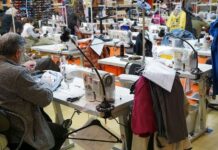The Secondary Materials and Recycled Textiles Association (SMART) is urging local officials in the United States to promote the responsible utilization of clothing collection bins as part of efforts to address the escalating issue of textile waste.
These collection bins are vital for prolonging the life cycle of textiles, diverting them from landfills, and contributing to a sustainable circular economy while simultaneously benefiting local economies.
This appeal comes at a time when governments worldwide are increasingly adopting policies such as Extended Producer Responsibility (EPR) programs to tackle the textile waste crisis effectively.
In the U.S., textiles contribute nearly 17 million tonnes of waste each year, accounting for approximately 6.3% of the total waste stream, as reported by the U.S. Environmental Protection Agency (EPA). Despite this significant figure, only a small percentage of textiles are recycled, even though around 95% could potentially be repurposed, according to the association.
SMART emphasizes that reusing and recycling textiles not only minimizes waste but also substantially reduces greenhouse gas emissions compared to other recyclable materials.
In response to this pressing issue, states like California have already enacted EPR legislation mandating large-scale take-back programs for used textiles. Other states, including New York and Washington, along with federal policymakers, are also exploring similar initiatives to enhance textile diversion rates.
SMART outlines several benefits of clothing collection bins:
- Increasing Textile Recovery: The textile recycling industry plays a key role in reducing landfill waste, diverting an estimated 4 billion pounds of clothing annually, with collection bins significantly enhancing recovery rates and promoting sustainability.
- Improving Donation Accessibility: Clothing collection bins offer a convenient disposal solution for consumers, especially in areas lacking physical donation centers, helping to prevent textiles from ending up in household trash.
- Creating Local Jobs: The management of clothing collection bins generates employment in logistics, warehousing, sorting, and recycling sectors, thus contributing to local economic development and advancing a circular economy.
- Supporting Charitable Efforts: Operators of clothing collection bins often partner with charities through revenue-sharing agreements, providing steady funding for community initiatives while advancing environmental goals.
- Reducing Municipal Waste Costs: By decreasing the volume of textiles sent to landfills, clothing collection bins help local governments lower landfill tipping fees, offering a cost-effective method for managing textile waste.
Additionally, SMART encourages local governments to establish balanced policies that ensure accountability and transparency while fostering cooperation with bin operators. The organization warns that excessive fees, restrictive placement regulations, and administrative hurdles could deter operators from providing this essential service.
SMART is advocating for local governments to recognize the importance of clothing collection bins in reducing textile waste. By endorsing their appropriate use, municipalities can promote sustainability, stimulate economic growth, and enhance community initiatives.

































